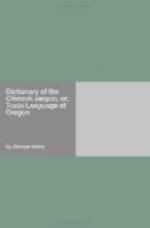[Footnote A: Journal Royal Geographical Society of London, vol. xi., 1841.]
The origin of this Jargon, a conventional language similar to the Lingua Franca of the Mediterranean, the Negro-English-Dutch of Surinam, the Pigeon English of China, and several other mixed tongues, dates back to the fur droguers of the last century. Those mariners whose enterprise in the fifteen years preceding 1800, explored the intricacies of the northwest coast of America, picked up at their general rendezvous, Nootka Sound, various native words useful in barter, and thence transplanted them, with additions from the English, to the shores of Oregon. Even before their day, the coasting trade and warlike expeditions of the northern tribes, themselves a sea-faring race, had opened up a partial understanding of each other’s speech; for when, in 1792, Vancouver’s officers visited Gray’s Harbor, they found that the natives, though speaking a different language, understood many words of the Nootka.
On the arrival of Lewis and Clarke at the mouth of the Columbia, in 1806, the new language, from the sentences given by them, had evidently attained some form. It was with the arrival of Astor’s party, however, that the Jargon received its principal impulse. Many more words of English were then brought in, and for the first time the French, or rather the Canadian and Missouri patois of the French, was introduced. The principal seat of the company being at Astoria, not only a large addition of Chinook words was made, but a considerable number was taken from the Chihalis, who immediately bordered that tribe on the north,—each owning a portion of Shoalwater Bay. The words adopted from the several languages were, naturally enough, those most easily uttered by all, except, of course, that objects new to the natives found their names in French or English, and such modifications were made in pronunciation as suited tongues accustomed to different sounds. Thus the gutturals of the Indians were softened or dropped; and the f and r of the English and French, to them unpronounceable, were modified into p and l. Grammatical forms were reduced to their simplest expression, and variations in mood and tense conveyed only by adverbs or by the context. The language continued to receive additions, and assumed a more distinct and settled meaning, under the Northwest and Hudson’s Bay companies, who succeeded Astor’s party, as well as through




